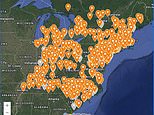
Traders work on the floor at the New York Stock Exchange on Oct. 24, 2024.
Brendan McDermid | Reuters
The Dow Jones Industrial Average sank deeper into the history books on Wednesday, with the index posting its 10th straight losing day as a disappointing rate outlook by the Federal Reserve rocked the stock market.
The Dow lost 1,123.03 points, or 2.58%, to 42,326.87, for its worst losing streak since an 11-day slide in 1974. The Wednesday decline was its worse since August and only the second time it lost 1,000 points this year in one session. The S&P 500 lost 2.95% to 5,872.16 and the Nasdaq Composite shed 3.56% to 19,392.69 with losses intensifying into the close of trading.
The central bank reduced its overnight borrowing rate by a quarter point to a target range of 4.25% to 4.5%, as expected. However, the Fed indicated Wednesday afternoon it would only cut rates twice in 2025, fewer than the four cuts given in its last forecast. Fed Chair Jerome Powell said the central bank's move to cut rates in recent months allows it to "be more cautious as we consider more adjustments to our policy rate."
Before Wednesday, traders were hoping the Fed would stay aggressive with rate cuts in 2025, fueling the bull market further. Treasury yields jumped following the Fed's cautious outlook, pressuring share prices. The 10-year Treasury yield crossed above 4.50%.

Dow, intraday
"Risk assets and a very highly valued stock market doesn't like the idea that rate cuts are less likely on both sides of the mandate," DoubleLine Capital CEO Jeffrey Gundlach said on CNBC's "Closing Bell." "The takeaway that I got from that press conference was there's not going to be an aggressive cutting cycle ... and the market is pretty much in sync with that."
The Dow's losing streak began the session after it closed above 45,000 for the first time ever on Dec. 4. The total losses for the Dow during its losing streak have totaled 6%.
"Good-bye punch bowl. No Christmas cheer from the Fed. Policymakers see higher inflation and lower unemployment in 2024. There is simply no reason to be dovish given that outlook," said David Russell, global head of market strategy at TradeStation. "The easy lifting is done now that rates are no longer clearly restrictive. It's a logical time to pause."
Before it intensified on Wednesday, the Dow's worst funk in decades was mostly caused by a rotation out of old economy shares and into technology stocks, a sector that the century-old measure underweights compared to broader market metrics.
But the whole market was rocked on Wednesday. The S&P 500's loss was also its worst since August and cut its 2024 gain to 23%.











